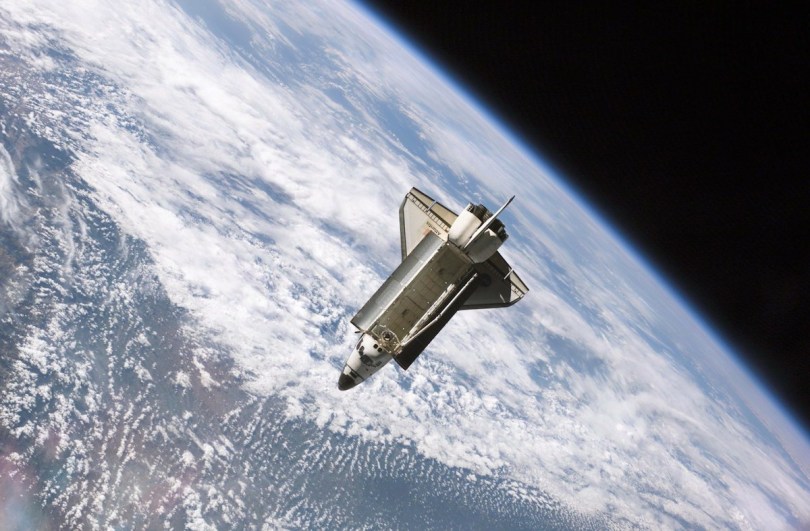On Tuesday, I wrote about NASA’s quest to put humans back on the moon by 2024. Space exploration and strategic dominance in space were early topics on this blog.
Indeed, today’s #TBT, “American Should Expand into Space,” was one of the first posts of the TPP 3.0 Era. The piece looks at the “heartland theory” of geopolitics, and applies that 115-year old concept to space. “He who controls space, controls the future,” or something like that.
It’s a compelling argument, and while I can’t take credit for applying this particular theory to space—I didn’t know about “heartland theory” until reading Captain Hendrix’s National Review piece about it—I’ve long argued that if the United States doesn’t expand into space first, our enemies will. You’d better believe the ChiComs wouldn’t hesitate to point a lunar laser at Washington, D.C. (hmm… perhaps not the worst of outcomes) given half the chance.
But I digress. Here’s hoping a combination of public and private investment in space exploration will yield a new era of boldly conquering the stars. Here is June 2018’s “America Should Expand into Space“:
Retired U.S. Navy Captain Jerry Hendrix has a piece up at National Review Online entitled “Space: The New Strategic Heartland” in which he urges Congress and the Department of Defense to establish a “Space Force” and to get serious about space exploration and colonization. It’s an excellent read, and makes some compelling points about why space is, truly, the final frontier.
Captain Hendrix bases his analysis in “heartland theory,” developed in 1904 by British geographer Halford Mackinder. 114 years ago, Mackinder argued that the “heartland” of future geostrategic conflict was Eurasia. Decades later, as Hendrix explains, former President Richard Nixon wrote that the Middle East and Africa—with their vast mineral resources—would hold the key to determining the victor in the Cold War (influence in these regions, Nixon argued, would determine whether capitalism or communism would prevail).
Now, Hendrix makes the case that space is the new “heartland,” and makes some intriguing points to that effect. Anyone who has followed the career and writings of former Speaker of the House Newt Gingrich will be familiar with these arguments; indeed, a decade ago I wrote a rough draft of a paper arguing for lunar colonization on similar grounds.
To summarize, they are as follows:
- China and Russian are looking to disrupt America’s dominance in communications, entertainment, and strategic defense, which we enjoy because of our preeminence in space—think of how disruptive it would be to lose communications or military satellites, which the Chinese are already targeting.
- Automated construction and manufacturing in space provide the capability to build and launch deep-space rockets more cheaply (the gravity of the moon is one-sixth that of Earth’s), allowing for more cost-effective space exploration.
- The free market will—and already has!—get more involved in space exploration. There are meteorites with more gold than has ever been mined on Earth. Consider, too, China’s dominance of rare-earth metals, which are abundantly available in the space, particularly the asteroid belt.
If space is going to remain a competitive domain, the United States will have to take the lead. I shudder to think of a Chinese controlled-moon, for example. I know it sounds batty, but do you really want the Chinese constructing a lunar death laser? They have the manpower and disregard for human life to do it.
There is room, too, for a conservative approach to space exploration, and we shouldn’t reflexively recoil at government involvement in this regard, so long as it’s done the right way. Just like the Homestead Act of 1862 (Gingrich actually proposed a “Homestead Act” for the moon!) or the role of the federal government in leasing lands for railroad companies, Congress can provide the framework for space exploration and colonization that would allow the free-market and private enterprise to kick in and work their magic.
What we should avoid is a bureaucracy that is so obsessed with “safety” and “diversity” that our space program is stillborn in its terrestrial cradle. Fortunately, there is a way forward, and Newt Gingrich delivers again.
Shortly after winning the South Carolina Republican presidential primary in 2012, Gingrich gave a speech in Florida in which he promised that, by the end of his second term as President (sigh… if only), we’d have a colony on the moon. When he gave this speech, I began hooping like a silver-backed gorilla—and immediately donated $100 from my meager 2012 salary to his campaign. He was widely derided for this position, but John F. Kennedy made a similarly bold claim in his young presidency—and, sure enough, by 1969, we had a man on the moon.
Since then, Gingrich has remained a strong supporter of space exploration. Indeed, he’s written on the topic twice recently, and I would encourage readers to explore his ideas further (I should note that I am heartened to see so many writers suddenly taking an interest in space exploration again).
1.) “A Glimpse of America’s Future in Space in 2024” (22 April 2018): http://www.foxnews.com/opinion/2018/04/22/newt-gingrich-glimpse-america-s-future-in-space-in-2024.html
2.) “Entrepreneurs will change space exploration (31 May 2018): https://good-politic.com/newt-gingrich-entrepreneurs-will-change-space-exploration/2614/
The economy is swinging again, American patriotism is back in style, and President Trump is a bold reformer who dreams and acts big (league). America is perfectly poised to build upon our already substantial lead in space exploration, and frontiers are our specialty.
Let’s go to Mars! Let’s build a colony on the moon! Let’s mine asteroids!



[…] Should Expand into Space” – this post was the topic of Thursday’s “TBT” feature. As such, I’ll refrain from lengthy pontificating about it. Essentially, […]
LikeLike
[…] about space exploration in a qualitative way—that is, more on the metaphysical and symbolic importance of space exploration, rather than the quantitative, technical side. I’ve always found the topic fascinating, and […]
LikeLike